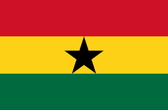
Call 0330 880 3600 Calls may be monitored or recorded. Opening Times.
- TRAVEL INSURANCE
- COVID-19 COVER
- More Options
- Help & Advice
- Existing Customers

Call 0330 880 3600 Calls may be monitored or recorded. Opening Times.

Need help?
UK Customer Services0330 880 3600*
Open Monday to Friday 9:00am to 6pm, Saturday 8:30am to 4pm and closed Sundays.
*Calls are recorded for training and quality purposes.

Official name: Republic of Ghana
Capital city: Accra
Official language: English
Population: Around 34 million
Currency: Ghanaian cedi (GHS)
Time zone: GMT (no daylight savings)
Driving side: Right
Climate: Hot and tropical year-round, with wet and dry seasons that shift by region
Ghana, often hailed as one of West Africa’s most welcoming countries, is known for its colourful culture, lively music and dance, and a proud history rooted in ancient kingdoms and the fight for independence. Its coastline is dotted with palm-fringed beaches and historic forts, while inland you’ll find rainforest reserves, bustling cities and traditional villages. Accra, Kumasi and Cape Coast each offer their own flavour of Ghanaian life, from markets and museums to nightlife and cuisine.
Bordering Côte d’Ivoire, Burkina Faso and Togo, Ghana stretches from the Atlantic Ocean in the south to the drier savannah lands of the north. The country’s geography shifts from coastal plains to forested hills and onto open grasslands, with Lake Volta - one of the largest man-made lakes in the world - at its heart. The highest point is Mount Afadja at 885 metres, and natural attractions include Kakum National Park’s canopy walkway and the waterfalls of the Volta Region.
Kotoka International Airport in Accra is the main entry point, with regional airports in Kumasi, Tamale and Takoradi. Domestic flights are useful given the distances and road conditions. Roads are the main form of transport, though traffic in Accra can be heavy and rural roads may be rough, especially in the rainy season. Buses and tro-tros (shared minibuses) are the most common way to get around, though they can be crowded. Taxis and ride-hailing apps operate in major cities.
Most visitors, including UK citizens, need a visa to enter Ghana. This should be arranged in advance through a Ghanaian embassy or consulate. A valid passport with at least six months remaining is required, and proof of yellow fever vaccination is mandatory. The British High Commission is located in Accra.
The Ghanaian cedi (GHS) is the local currency. Cash is widely used, particularly outside Accra, although card payments are becoming more common in hotels and restaurants. ATMs are available in cities, but reliability varies, so carrying some cash is sensible.
Healthcare varies in quality. Major cities such as Accra and Kumasi have hospitals and clinics, but rural areas have limited facilities. Malaria is widespread, so preventive medication and mosquito protection are essential. Proof of yellow fever vaccination is required for entry, and other recommended vaccines include hepatitis A and typhoid. Tap water is not safe to drink, so bottled or filtered water is strongly advised. Comprehensive travel insurance with medical evacuation cover is recommended.